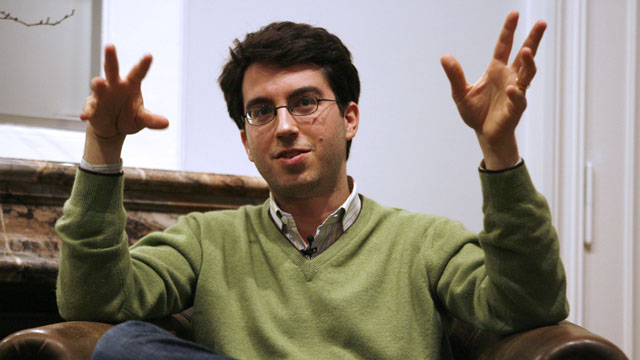“A result of a certain kind of overparenting, we are learning, is children who are better prepared for college but less prepared for life.” Lisa Belkin says parenting has become too sacred.
All Articles
“The loss of linguistic diversity means permanently shutting the door on a vast wealth of potential scientific knowledge.” Obit’s Axel Rose on the downside of English as lingua franca.
“There’s a better reason for the non-fanatical to return to an antiquated medium like vinyl. Listening to music on a computer or iPod via headphones has become the ultimate in anti-social activities.”
“What explains the ascendance of Homo sapiens? Start by looking at our pets.” The Boston Globe says our ability to domesticate and control other species accounts for our formidable rise.
“How does one come to have certain ideas about L.A. without actually experiencing it?” n+1 meditates on the sun, fun and doom captured in the novels of Bret Easton Ellis.
“Under our current system of campaign finance, there is a fundamental gap between the interests of voters and of contributors.” Harvard’s Lawrence Lessig on the Congress’ institutional corruption.
“Either you and everyone you love are going to be killed by robots; or you are going to live forever.” A.I. guru Michael Vassar on what future technology has in store for humans.
“Athletic teams, administrators and tenured professors soak up huge chunks of colleges’ budgets, and tuition and fees rise to keep up.” The L.A. Times follows the money trail.
“If the past is any guide, plenty of today’s science will be discredited in future. There is no reason to think that today’s practitioners are uniquely immune to the misconceptions.”
The latest product from fuseproject brings a whole new meaning to the “design for good” conversation. FORM3 is a waterproof rechargeable designer vibrator made out of medical-grade silicone and designed […]
A world free of disease and poverty. A dictatorial and all-powerful artificial intelligence. Picnics on sunny days with one’s grandchildren, great-grandchildren and great-great-grandchildren. Genetically engineered dangerous mutants. Which one of […]
“Sept. 11 used to be a day when America came together—party politics took a backseat to reconciliation. The anniversary of the terrorist attacks this year threatens to become a day of hate.”
“Nine years later, it’s so easy to get people to go crazy. If I wanted to, I could probably start another India-Pakistan war all by myself.” The New Yorker’s George Packer on the loss of reason.
“President Obama and his administration have embraced the secrecy and usurpations of power that made possible the Bush-Cheney betrayal of American values.”
“Did 9/11 make us all mad? Our memorial to the innocents who died nine years ago has been a holocaust of fire and blood.” The Independent’s Robert Fisk laments the ongoing wars.
“Barack Obama’s expected advantages are turning into handicaps in the war on terrorism.” The Economist says the softer, kinder President has failed to distinguish his own approach.
“When confronting threats real or imagined, Americans tend to go big, very big.” A former Middle East CIA specialist says the political response to terrorism is often too cumbersome.
“Artists know as well as anybody that music sells stuff, so why shouldn’t they sell the stuff too?” Rob Walker says musicians no longer lose credibility by marketing products.
Why do we listen to someone talking on the phone with more attention than to a conversation where we hear both sides? The Frontal Cortex explains the unavoidable temptation to eavesdrop.
“Anyone who’s ever waited at the Post Office, applied for a driver’s license, or filled out a tax return knows that government is no model for efficiency.” The Adam Smith Institute Blog opines.
“Government policies to prop up the housing market not only have failed to fix the problem, they are prolonging the agony.” Nobel Laureate Joseph Stiglitz on how to fix the housing crisis.
I still remember seeing the Tribute in Light from the New Jersey side of the Hudson. From a distance, the twin beams of light standing where the World Trade Center […]
Yesterday, U.S. District Court for the Central District of California Judge Virginia Phillips declared the military’s “Don’t Ask, Don’t Tell” policy unconstitutional. In her ruling—which comes on the heels of […]
Laboratory tests find that exposure to sexual stimulus makes individuals impatient. Does this mean that people in more sexualized societies are less likely to save money?
Novelist Jonathan Safran Foer wants you to stop eating meat—not because he cares so much about the fluffy animals, but because it’s killing the environment. In his Big Think interview Foer shared with us just how devastating the factory farm industry is, something he learned while researching his first work of non-fiction, Eating Animals. “Animal agriculture is the number one cause of global warming, and yet very few people, including people who are normally quite political and quite moral and moralizing, talk about it. And even fewer people act on their concerns about where food comes from.”
The reason changing Americans’ eating habits is so difficult is because eating meat is ingrained in our cultural narratives as Americans. “Food is not just fact and it’s not just reason; it’s culture, it’s personal identity,” Foer says. “It’s what our parents and our grandparents fed us, it’s how we think of ourselves, and it’s always attached to some kind of a story. And that confuses things. The Thanksgiving turkey confuses things. The Christmas ham confuses things. Every family has its own version.”
And creating a new narrative that excludes meat will be tough largely because Americans are subsidized to eat this way. American farm subsidies lower the price of meat while encouraging inhumane and environmentally damaging farming practices, so much so that the real cost of a 50-cent hamburger, factoring in environmental costs, is actually $200. Plus, the subsidies hamstring farmers that use traditional, non-industrial methods of farming: “We have now created an economic system which is very advantageous to feed animals unnaturally, house them unnaturally, and raise genetic stocks that are destined for illness,” Foer says. “And the small farmers, who are really the heroes of my book, farmers at places like Niman Ranch, farmers like Frank Reese at Good Shepard, farmers like Paul Willis, are at a severe economic disadvantage for doing things the right way; for being environmentally responsible; for treating their animals like animals rather than like rocks or pieces of wood.”
Foer told us that change is very necessary but possible, debunking the idea that industrialized factory farming is necessary to feed the world. The idea that factory farming is necessary to feed the nearly 7 billion inhabitants of earth is “not only untrue, it’s the opposite of the truth,” he says. “It takes seven calories of food input into an animal to produce one calorie of food output. It’s an extraordinarily inefficient way to produce food.” And if the Chinese and Indians begin to eat like American do, which has been the trend in the developing world, “we’re going to have to farm twice as many animals as we do now.” That would amount to 100 billion animals every year.
Foer also spoke to us about his fiction work, telling us that he values the freedom of fiction but that the same freedom is what makes fiction so difficult. And he gave us his take on the film adaptation of his debut novel “Everything Is Illuminated” as well as his thoughts about the form of the novel in the age of the iPad. Literature has always been “slower than the other art forms to grapple with technological and cultural changes…and I think that’s one of the things that people love so much about it,” he said. Whereas music and the visual arts have changed dramatically in the past 100 years, literature has remained largely the same. “Maybe it’s been the saving grace of literature to be so conservative,” Foer muses. “But maybe it will contribute to its death.”
Why exactly do fights break out when people are drinking? You might think it’s simple biochemistry—alcohol molecules wreaking changes on brain cells, leading to behavior change, leading to a broken […]
Blogger David Xia friend swiped this card from Citibank while he was there for an interview. It’s a list of tips for women on how not to sabotage their careers […]
Stephen Hawking’s latest book Grand Design sits atop the Amazon best-seller list and has been the subject of gobal news attention and debate. Driving discussion (and sales) is Hawking’s “no […]
Some factions within the natural childbirth movement are attempting to popularize the concept of “birth rape.” The idea is that women who are handled roughly, verbally abused, or bullied into […]
Two small asteroids that were discovered on September 5th by the Catalina Sky Survey near Tucson, Ariz., whizzed past the Earth on Wednesday. According to scientists, the first asteroid (2010 […]










